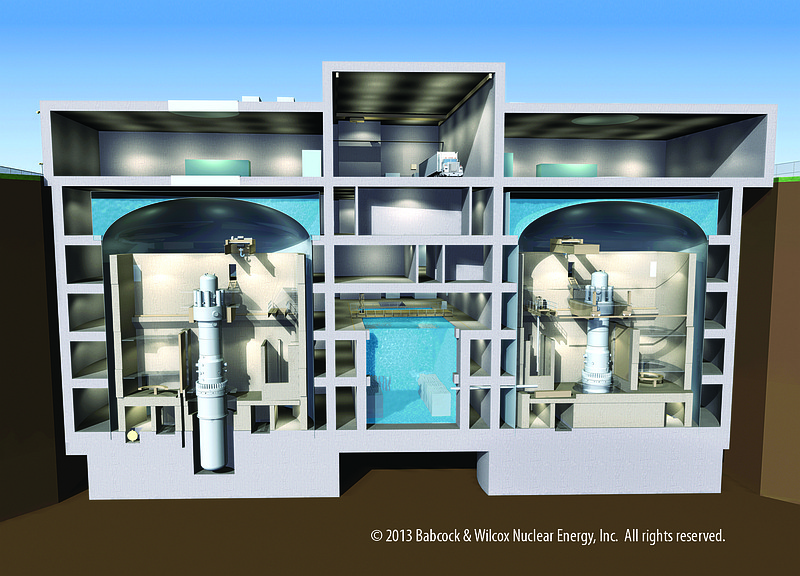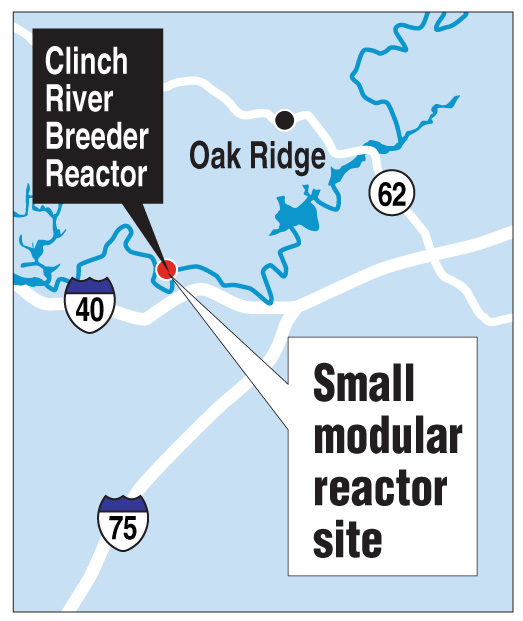Federal regulators said Thursday they are ready to begin reviewing a proposal by the Tennessee Valley Authority to possibly build America's first small modular nuclear plant on the Clinch River in Oak Ridge, Tenn.
The Nuclear Regulatory Commission has accepted for review the early site permit application from TVA to build a new type of atomic reactor on the site of another experimental nuclear plant abandoned nearly 35 years ago. Regulators have yet to certify any of the proposed new small modular reactor plant designs, but TVA's initial permit application would clear the way for the site to be approved and ready if such plants are ultimately developed and TVA decides to pursue the new technology.
"Accepting the application for review, or docketing the application, does not indicate whether the Commission will approve or reject the request," NRC spokesman Scott Burwell said Thursday.
But already, the Southern Alliance for Clean Energy is vowing to fight any TVA effort to build the new reactor designs.
TVA, which last year completed the Watts Bar Unit 2 reactor and sold its unfinished Bellefonte Nuclear Power Plant, has no immediate plans to build more nuclear plants. But the utility is working with the U.S. Department of Energy to test the new smaller reactors and the preferred site for such a test is on the Clinch River near DOE's Oak Ridge National Laboratory.
"We believe that small modular reactors offer a great potential of taking all of the benefits of nuclear power in terms of producing 24-7, carbon-free energy and moving it on to a new generation of plant design," said TVA spokesman Jim Hopson. "No decisions have been made yet whether we will actually deploy this technology, but we want to work with the Department of Energy to pursue the potential of SMRs (small modular reactors) and to make sure this site is ready if we decide to move ahead."
TVA previously worked with DOE on the same 1,364-are site in the 1970s to build a 1,000-megawatt liquid metal fast breeder reactor. Congress ultimately scrapped the project in 1983 after concerns about the technology being too expensive and potentially helping nuclear proliferation around the globe.
"Once again the Department of Energy is repeating past mistakes by pushing a highly speculative nuclear power technology that doesn't exist in the real world," Sara Barczak, a program director for the Southern Alliance for Clean Energy, said in a statement Thursday. "This is the same site where breeder reactors were once proposed and ultimately failed, after squandering lots of money. Given there are no certified reactor designs, nor has a thorough review by the NRC of any designs here in the U.S. even been conducted, small modular reactors should be more accurately described as 'mystery' modular reactors as there is no rational or economic reason to pursue them."
TVA submitted its early site permit application to the NRC last May for potentially siting up to four small modular reactors in Oak Ridge.
Small modular reactors are designed to produce less than 300 megawatts of electricity - only one fourth the size of TVA's biggest reactors - and are intended to be built in factories with modular designs and installed in small, often underground sites, which proponents believe would make such plants safer and more secure. The smaller designs also would allow nuclear plants to scale up in smaller increments to meet changes in power demand.
The NRC plans to soon publish in the Federal Register a notice of opportunity to intervene in an adjudicatory hearing to allow opponents and other interested parties to intervene and challenge whether the Oak Ridge site is appropriate for a nuclear plant. Petitions to intervene in a hearing must be filed within 60 days of the notice, Burwell said.

